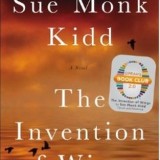
Review: The Invention of Wings, Sue Monk Kidd
Positives
Negatives
There was a time in Africa the people could fly. Mauma told me this one night when I was ten years old. She said, ‘Handful, your granny-mauma saw it for herself. She say they flew over trees and clouds. She say they flew like blackbirds. When we came here, we left that magic behind.’
Some stories are comforting. These are usually the ones we gravitate toward when we are down and in need of some pep. Novels like The Help, Gone with the Wind, and even To Kill a Mockingbird are popular books that get us out of the depths of despair. They are not—at least at their core—about happy things, but they give us peace because good prevails in the end. Sue Monk Kidd’s latest novel, The Invention of Wings, will undoubtedly face comparisons to the aforementioned texts. And commonalities are easy to identify; however, The Invention of Wings is good enough that it stands on its own. Kidd hasn’t just crafted an important narrative for America’s canon of slave-driven narratives; she’s written a necessary story about women finding courage in the face of adversity.
Set in 19th-century Charleston, South Carolina, The Invention of Wings tells two stories. Both have a basis in reality, but the first, which is told from the perspective of Hetty “Handful” Grimké, takes the biggest leaps into the imagined. Handful was a real person, but the story Kidd delivers is one largely of make believe.
Before becoming a teenager, Handful falls under the ownership of Sarah, one of the Grimké family’s daughters. Handful is lucky thst Sarah does not want a slave. Handful, in fact, confesses that her name is apt: “I was a handful.” She is full of mischief and curiosity. She wants to write, looks through drawers, hides household items, and disobeys most people. Nevertheless, Handful is a character to love. The bond she shares with her mother is special. Pure love comes across easily. Another special relationship is the one between Handful and Sarah. They are friends, but there are barriers that simply can’t be broken, especially while the girls are young. Handful admits:
I didn’t know for sure whether Miss Sarah’s feelings came from love or guilt. I didn’t know whether mine came from love or a need to be safe. She loved me and pitied me. And I loved her and used her. It never was a simple thing. That day, our hearts were pure as they ever would get.
As time takes it toll on Handful, she refuses to calm down. She wants freedom, and much of her story is about her journey to attain it.
The second viewpoint, arguably the most effective, is that of Sarah Grimké. Sarah is not like other 19th-century Southerners. She is independent and condemns slavery. On her eleventh birthday, Sarah receives Handful as a present. Immediately, Sarah does not want her gift. She writes a letter to free Handful, and slowly teaches the girl to read and write. Life is unkind to Sarah. In addition to her poorly received diatribes regarding slavery, her family ignores her and she stutters. However, she does have a younger sister named Nina with whom she can share her ideas. They bond over their shared hatred of slavery. Sarah moves away with the desire to do something about society, although she is much too timid to act on her notions. Not to give too much away, but Kidd’s novel’s title plays directly into the ending. Sarah learns to fly.
The sections involving Sarah weave among themes. While young, she deals with isolation and familial displeasure. As she grows into her teen years, love hits Sarah hard and so does the idea of leaving her family behind. All of her internal struggles lead to her great achievement of courage. She speaks, and people listen. Kidd, without being too direct, addresses the issues that many 19th-century women faced, and she handles it beautifully.
Kidd uses language that is simple yet thoughtful. She never makes the story too dense, and she holds back from taking it down the other road of being fluffy and syrupy sweet. It all seems so nicely balanced. Handful’s and Sarah’s stories both move quickly, and remain engaging throughout.
To put it plainly, The Invention of Wings soars.

